“Create, Connect and Share Respect” – Safer Internet Day 2018
| 6th February 2018

Coordinated by the UK Safer Internet Centre, the 6th of February is the annual celebration of the internet, its users, and the opportunities it creates. It also serves to promote the safe use of the digital technology accessible to more young people and children than ever.
According to a 2015 Pew Research study, 24% of teens went online “almost constantly” due to the widespread use of the smartphone, and as seen here between 52% and 71% of teens use Facebook and Instagram. Whilst this does mean young people are more connected than previous generations, it does heighten the problems that the internet also offers.
Today is Safer Internet Day! We can't wait to see what is happening across the country to celebrate #SID2018! Find out more about how you can get involved at https://t.co/A5RMSu69SP pic.twitter.com/Q9PF8vo5BL
— UK Safer Internet Centre (@UK_SIC) February 6, 2018
Using the hashtag #SID2018 and an online base over at saferinternet.org.uk, three lead charities (Childnet, the South West Grid for Learning, and the Internet Watch Foundation) are encouraging young people, parents, and even tech companies to help make the internet a safe place.
For most young people between the ages of 11 and 17, cyber-bullying is the biggest risk of web browsing and social media usage, with 1 in 3 falling victim to it at some point.
Charities outside of the movement such as the NSPCC want parents to take time with their children to set rules, limit internet use, and restrict access to certain sites.
It’s Safer Internet Day 📱 If you’re a professional working with children, contact @UK_SIC online safety helpline for advice about keeping young people safe online: https://t.co/d8WA6520A8 #SID2018 pic.twitter.com/3aDiHVgVH9
— NSPCC (@NSPCC) February 6, 2018
However, the risks of the internet don’t disappear once you get older. It could be argued that they only worsen, with fears of identity theft, privacy, and viruses heightening in previous years.
An increasing number of people report being worried about their mobiles, laptops, and tablets being tracked, whilst nearly 7% of the UK public say they tape their devices cameras over (something even Mark Zuckerberg has suggested).
Outside of this, surveys have shown that a fairly high number of men have concerns surrounding camera exploitation whilst using their devices to watch pornography and similarly, an increasing number of women are more aware of the cagey implications that the internet’s high-speed spread of information carries when it comes to intimate imagery.
On #SaferInternetDay, blogger Beth, reflects on her relationship with her smartphone. https://t.co/Hzl739blJk
— YoungMinds (@YoungMindsUK) February 6, 2018
So if it’s not the government watching our every move, or having our credit card info stolen, then it’s email logins being sold off – should you just stop using the internet altogether?
Well, I’m sure most of us couldn’t even if we wanted to, but here are just a few things you can do to protect the increasingly rare commodity that is online safety.
- We’ll start off with a fairly obvious one – lock your devices from the outset with a PIN, password or pattern. This will leave thieves or nosey parkers waiting at the doorstep that is your lock screen.
- If any of your devices have escaped your grip somehow, then you’re going to regret it if there are no apps that will remotely lock or wipe its data. Familiarise yourself here.
- “Private browsing” is probably something for those who also tape their cameras over, it’s a setting on most browsers that deletes cookies, your browsing history, and temporary Internet files. Similarly, hiding IP addresses via VPN’s or other free networks allows you to surf the web anonymously. This stops companies online from taking and selling your information to advertisers.
The UK Safer Internet Centre, official coordinators of Safer Internet Day has today released new research revealing that young people are more likely to have a positive experience than a negative experience when online. Find out more at: https://t.co/UecTbcTv8f #SID2018 pic.twitter.com/E6MgTQ4MyP
— Anti-Bullying Alliance #AntiBullyingWeek (@ABAonline) February 6, 2018
In terms of protecting children online, it can be as simple as talking to them:
- Make sure children know the risks of clicking on certain things online, let them know that not everything people say online is pleasant (which is an understatement at its best).
- Many browsers make it easy for parents and guardians by having options that filter out sexual, violent, or inappropriate material. There are even child-specific browsers.
- Annoyingly, browsing the web isn’t the full job. Don’t forget about video game accounts such as Xbox Live and PlayStation Plus, which can put them in contact with other players who often don’t hold back in saying some pretty horrific things…
For more information, or if you want to get involved in spreading awareness this Safer Internet Day, click here.
Teachers, is your school ready for Safer Internet Day? Check out some resources including lesson plans, films, games,quizzes and drama activities from @UK_SIC https://t.co/MIWN12YjV5 #SID2018 pic.twitter.com/vgP503OBla
— Department for Education (@educationgovuk) February 4, 2018
